Ortek Technology PROM910JOR1001 Wireless Office Mouse User Manual MCK 9000UserMan
Ortek Technology Inc Wireless Office Mouse MCK 9000UserMan
user manual

Wireless Office Keyboard/
FCC ID: GM8LAB2229100100 And
Wireless Office Mouse/
FCC ID: GM8PROM910JOR1001
User’s Manual
Version 1.0 2002/10
ID NO: PAK-23191001-00

Wireless Office Keyboard And Mouse
1
About This Manual
This manual is designed to assist you in installing and using the Wireless
Office Keyboard and Mouse. Information in this document has been
carefully checked for accuracy; however, no guarantee is given to the
correctness of the contents. The information in this document is subject to
change without notice.
Edition
1st Edition,
Copyright
© Copyright 2002
This document contains proprietary information protected by copyright. All
rights are reserved. No part of this manual may be reproduced by any
mechanical, electronic or other means, in any form, without prior written
permission of the manufacturer.
Trademarks
All trademarks and registered trademarks are the property of their respective
owners.

Wireless Office Keyboard And Mouse
2
FEDERAL COMMUNICATIONS COMMISSION STATEMENT
This Equipment has been tested and found to comply with the limits for a
class B digital device, pursuant to Part 15 of the FCC rules. These limits are
designed to provide reasonable protection. This equipment generates, uses,
and can radiate radio frequency energy and, if not installed and used in
accordance with the instructions, may cause harmful interference to radio
communications. However, there is no guarantee that interference will not
occur in a particular installation. If this equipment does cause harmful
interference to radio or television reception, which can be determined by
turning the equipment off and on, the user is encouraged to try to correct the
interference by one or more of the following measures:
♦ Reorient or relocate the receiving antenna.
♦ Increase the separation between the equipment and receiver.
♦ Connect the equipment into and outlet on a circuit different from that to
which the receiver is connected.
♦ Consult the dealer or an experienced radio/TV technician for help.
Changes or modifications not expressly approved by the party responsible
for compliance could void the user‘s authority to operate the equipment.
WARNING
A shielded-type power cord is required in order to meet FCC emission
limits and to prevent interference to nearby radio and television reception. It
is essential that only the supplied power cord be used.
Use only shielded cables to connect I/O devices to this equipment.
You are cautioned that changes or modifications not expressly approved by
the party responsible for compliance could void your authority to operate
the equipment.

1. Installation.....................................................................................................19
2. Wireless Optical Mouse Functions .........................................................20
3. Setting Wireless Optical Mouse and Program ....................................20
Setting wireless optical mouse..................................................................21
Magic Function.............................................................................................23
Troubleshooting.........................................................................................…24
Introduction........................................................................................................4
System Requirements ..............................................................5
1. Installation.......................................................................................................6
Installation for Windows® 98/ME/2000/XP.............................................6
Un-installation .................................................................................................6
2. Office Keyboard Button Functions ...........................................................7
Important Notes Regarding Software Support....................................12
About the PLAY and € Function..............................................................14
3. Setting Wireless keyboard and Program...............................................14
Office Keyboard Buttons............................................................................15
Wireless Office Keyboard...........................................................................15
OnScreen Display.........................................................................................16
About................................................................................................................17
Exit....................................................................................................................18
4. Patent List......................................................................................................18
Wireless Optical Mouse:
TABLE OF CONTENTS
Wireless Office Keyboard:
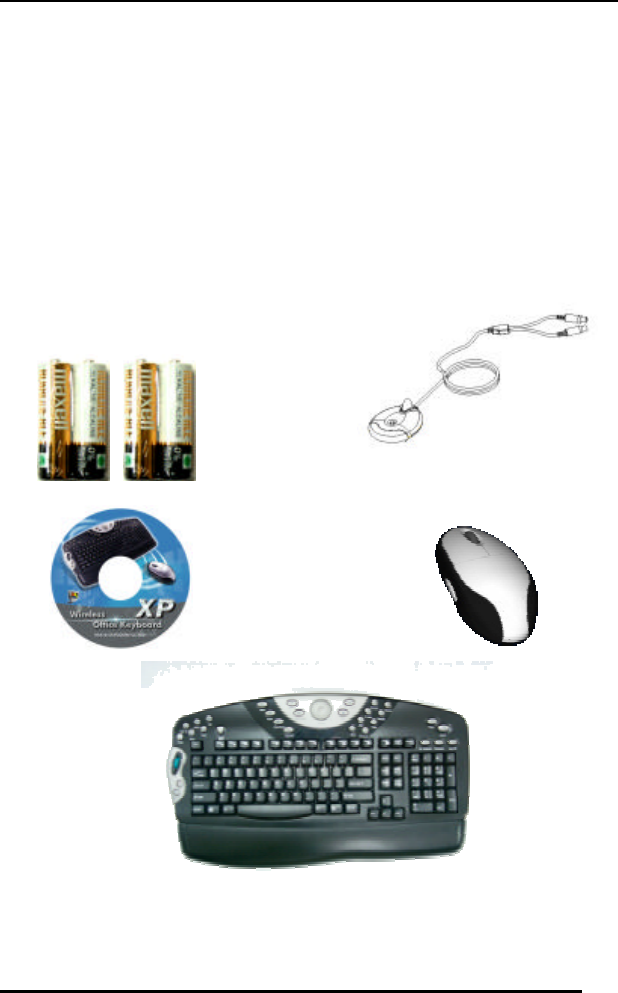
Wireless Office Keyboard And Mouse
4
INTRODUCTION
Thank you for purchasing the WIRELESS OFFICE KEYBOARD AND
MOUSE. This User’s Manual contains information that will help you to
operate your keyboard as well as answer questions about certain special
keys and buttons. Please keep this manual and the Setup CD in a safe place
for future reference.
Package Contents
A. Batteries B. Receiver C. Software D. Mouse E. Keyboard
E
D
C
B
A

Wireless Office Keyboard And Mouse
5
SYSTEM REQUIREMENTS
Before installing the Wireless Office Keyboard and Mouse software, please
make sure that the following hardware and software components are
installed and correctly set up. The following system specifications are
required:
• Pentium 133 or higher processor.
• Microsoft Windows® 98/ME/2000/XP operating system or later.
• Microsoft Internet Explorer 4.0 or later.
• 64MB of RAM is recommended.
• CD-ROM or DVD drive.
• Two AA alkaline batteries for keyboard and two AA alkaline
batteries for the mouse.
• To use the new enhanced Office features, you also need:
n Microsoft Office 97 or later is recommended. (With Word,
Excel, Power Point or MS Outlook installed, the wireless
Office Keyboard will perform more functions).
n The enhanced Office features are compatible with a number
of other leading applications as well. (If the application
function name is the same as the Hot Key printed name,
pressing that Hot Key should perform the same function).

Wireless Office Keyboard And Mouse
6
Wireless Office Keyboard:
1. INSTALLATION
l Package Contents: Batteries; Receiver; Software; keyboard
l Install the batteries in the keyboard.
l Turn off the computer. Connect the receiver to the desktop.
l Turn on your PC, and then install the software.
INSTALLATION FOR WINDOWS® 98/ME/2000/XP
• Before installing the Wireless Office Keyboard driver, check to see
if there are any other keyboard drivers already installed on your
system. All other keyboard drivers must be uninstalled BEFORE
installing the Wireless Office Keyboard drivers.
• Insert the Driver CD into your CD-ROM drive and the CD will
Auto Run. If it does not, please choose (Run) from the Start Menu.
The file name on the CD is ”AUTORUN”. The first screen is an
introduction. Read it before proceeding to the next step. The
software will automatically begin to install to your hard disk in a
sub-directory titled C:\PROGRAM FILES\NETROPA\. After
installation, you will be prompted to restart your computer in order
to enable the Wireless Office Keyboard software.
• Click (Finish) and restart your computer. The Wireless Office
Keyboard Icon will be activated automatically after Windows
restarts.
NOTE: After installing the Wireless Office Keyboard drivers, you
must restart your computer, or the Wireless Office Keyboard software
will not be enabled.
UN-INSTALLATION
To remove the Wireless Office Keyboard drivers from your system,
simply go to Setting à Control panel à Add/remove programs and
remove “Office Keyboard” application software.

Wireless Office Keyboard And Mouse
7
2. Wireless Office Keyboard Button Functions
• Office Application Keys: Word, Excel, PowerPoint, and Calendar.
• Internet Buttons: Back, Forward, Stop, WWW, Email, Favorite,
Refresh, and Search.
• Application Buttons: My Computer, Calculator, Log Off, Sleep
and Power.
• Multimedia Buttons: Play/Pause, Stop, V+, V-, Mute, Next track
and Pre-track.
• Clipboard Buttons: Cut, Copy, Paste, Mark, Back, Forward,
Application Switch, Close and Scroll wheel.
• Enhanced Function Buttons: Help, New, Open, Save, Replace,
Spell, Undo, Redo, Reply, Reply All, Forward, Send and Print.
Please make sure that both the hardware and software requirements
referenced on Page 4 are met prior to using any of the Wireless Office
Keyboard Buttons.
Function Name Function Description
Word Open Microsoft Word. You can also reassign the
Word Hot Key to use a different Application.
Excel Open Microsoft Excel. You can also reassign the
Excel Hot Key to use a different Application.
Power
Point
Open Microsoft Power Point. You can reassign the
PowerPoint Hot Key to use a different Application.
Calendar Open Microsoft Outlook, The default is set to
Calendar. You can also reassign the Calendar Hot
Key to open a different Application.
Back Goes back to a previous item that was already
viewed in programs that support the “Back”
command, such as a Web browser
Forward Goes to the next item—if it was previously viewed
in the same session, in programs that support the
“Forward” command, such as a Web browser.

Wireless Office Keyboard And Mouse
8
WWW
Starts the default Web browser and goes to the
home page. If the Web browser is active, it opens
the home page. You can reassign the WWW key to
start another Web/Home or use a different
Application.
Email
Starts the default e-mail program. Pressing the Mail
Hot Key will tell you what the default e-mail
program is. You can reassign the mail Hot Key to
start another email Program or use a different
Application.
Refresh Updates the Information on an active Web page or
the contents of certain windows.
Search Open the Internet Explorer Search pane.
My
Computer
Opens My Computer. This shows the contents of the
floppy disk, hard disk, CD-ROM drive and network
drives, etc.
Calculator
Starts Microsoft Calculator
Log Off
Opens the log off Windows dialog box. Logging off
closes all programs, disconnects the computer from
the network, and prepares the computer to be used
by someone else.
Sleep
Puts the system into Sleep mode if the PC supports
power management and it is enabled. You can put
your computer to sleep by pressing this button
directly on your desktop, protecting your data and
saving energy. If power management is not enabled,
this Hot Key will not work.
Power
Puts the system into Power-Off mode if the PC
supports power management and it is enabled. You
can power off your computer with the press of a
button. If power management is not enabled, this
Hot Key will not work. The Power-On function
available depends on how the Motherboard is set up.
For more information about how your system
resumes operation, see the documentation that
accompanied your computer or contact the dealer or
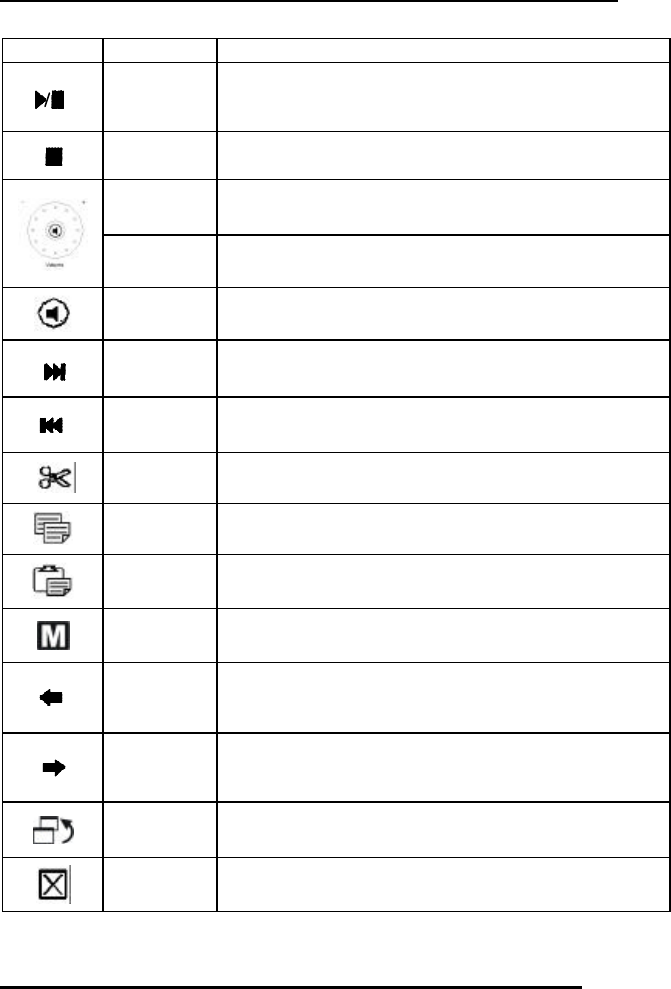
Wireless Office Keyboard And Mouse
9
manufacturer.
Play/Pause Switches between Play and Pause of
DVD/VCD/MP3/Audio media. Once Pause is
pressed, pressing this button again resumes play.
Stop Stops playing the media.
V- Decreases the computer’s sound volume. Turn left
to decrease volume.
V+ Increases the computer’s sound volume. Turn right
to increase volume.
Mute Mutes the computer’s sound volume. Press it again
to turn the system volume back on.
Next track
Switches to the next media track. Press once for
each subsequent media track.
Pre-track Switches to the previous media track. Press once for
each preceding media track.
Cut Cuts the selected item(s) to the Clipboard.
Copy Copies the selected item(s) to the Clipboard.
Paste Pastes the previously cut or copied item(s) from the
Clipboard.
Mark Use the cursor movement directional arrow keys
and Mark key to select and Mark item(s).
Back Goes back to a previous item you already viewed in
programs that support the “Back” command, such as
a Web browser.
Forward Goes to the next item—if it was previously viewed
in the same session in programs that support the
“Forward” command, such as a Web browser.
App Sw Switches between the active window and a
previously opened window.
Close Closes the active Windows® Application.
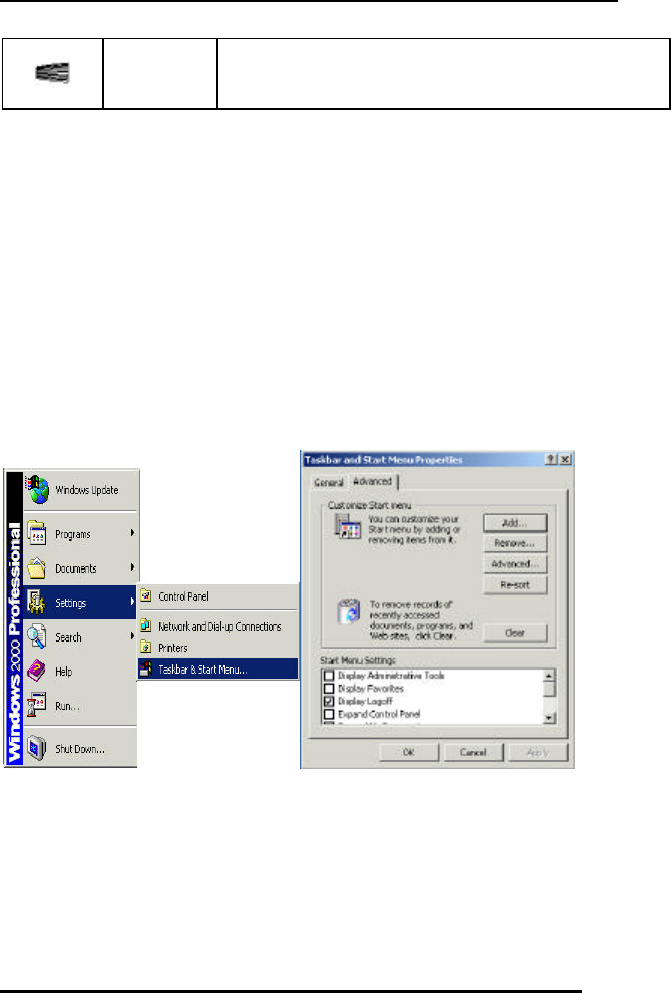
Wireless Office Keyboard And Mouse
10
Scroll
Wheel Provides the same functions as a scrolling mouse.
Note: for the “Log Off” key:
• For Win 95 / 98 / ME / XP: Some applications require a great
deal of system resources. This can lead to the delayed reaction of
the “Log Off” key. If the Log Off dialog window does not open
when the key is pressed or only the “Start” menu opens, press
“ESC”, then press the “Log Off” key again.
• For Win NT: The “Log Off” key feature is not available under
Win NT.
• For Win 2000: The “Log Off” key has to be activated. To do so,
proceed as follows: “Settings-Taskbar-Advanced-Display
Logoff”:
Description of “Pop-up” function (Optional function of Scroll Wheel or Bar)
This is an optional function of the Scroll Wheel. When you press the “Scroll
Wheel” or “Scroll Wheel Bar”, it will pop up an OnSreen Menu on your
screen. See below:
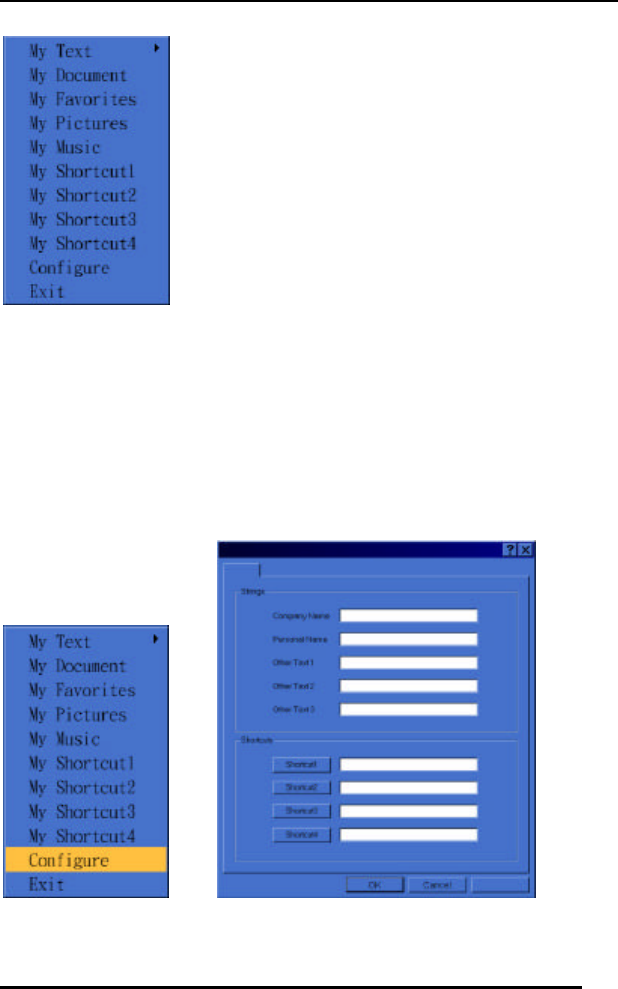
Wireless Office Keyboard And Mouse
11
(On Top)
The OnScreen Menu will provide you a quick access to the frequently used
text, document or music, etc. You can immediately edit or insert the
sentence, name or text with a simple key press, or select the favorite
application as if you were using a mouse to scroll and click. You can also
shortcut for any frequently used task. Before using the OnScreen Menu, you
should configure the frequently used text, task or application first. Please
move the scroll wheel to select (click) the “Configure” on the Menu. It will
open a dialog box for pre-setting. Please write down the sentence, name or
text that you use constantly, or shortcut the application you use frequently.
Clic k “OK” after the setting is done.
(On Top)
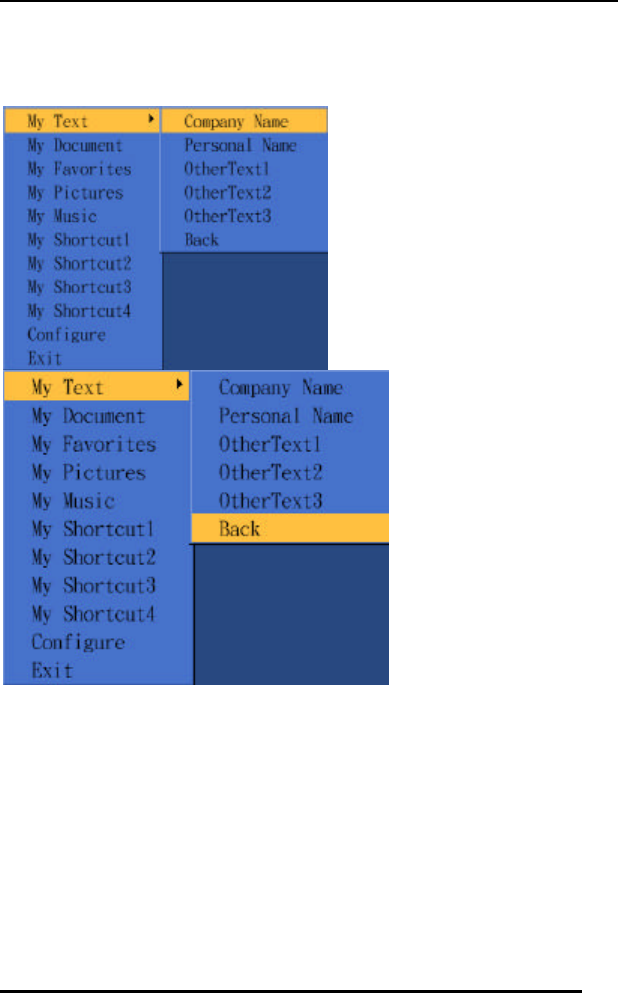
Wireless Office Keyboard And Mouse
12
Now you can scroll and get a quick access from the Menu. If you select
(click) “My Text”, it will pop up another selected items for further choices.
See below:
(On Top)
You can insert or paste the frequently used sentence, name or text into any
Windows application that on the background (Word, Excel…). If you select
“Back”, it will go back to the previous selected items. If you select “Exit”,
the OnScreen Menu will close and disappear automatically. See below:
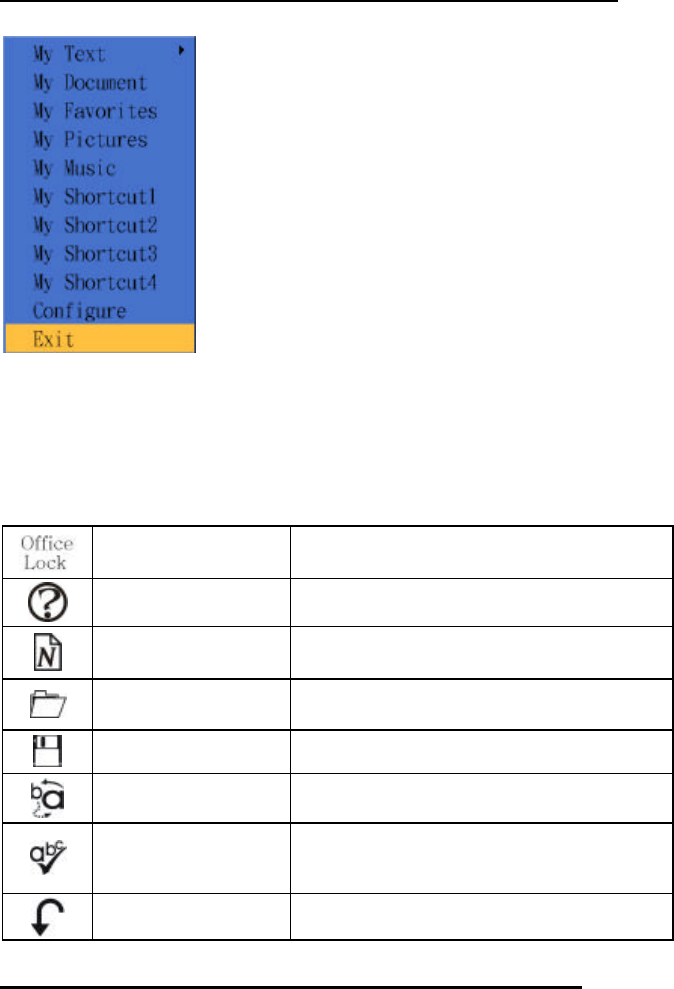
Wireless Office Keyboard And Mouse
13
(On Top)
Note: The “Pop-up” function is both available for PS/2 and USB keyboard. You
can press the scroll wheel to pop up the menu, and scroll and click for selecting
items while using PS/2 keyboard. But, while using USB keyboard (or PS/2 to USB
adapter) you should use mouse to scroll and click for selecting items. The scroll
wheel function on keyboard is disabled automatically under USB product.
Enhanced Function Keys: (12 Embedded Office Keys that are controlled by the
“Office Lock Key”)
Office Lock key
Enables the 12 Embedded Office Keys. By
default, the function is ON.
F1: Help
Opens the Help file (if any) for the active
window.
F2: New
Creates a new document in programs that
support this command.
F3: Open
Opens a document in programs that support
this command.
F4: Save Saves the file in the active window.
F5: Replace
Searches for and replaces the specified text
and formatting.
F6: Spell Starts the spell-
checking program in the active
document, if the document’s program has this
feature.
F7: Undo
Reverses the last command or deletes the last
entry typed or action taken.

Wireless Office Keyboard And Mouse
14
F8: Redo Redoes the previously undone action.
F9: Reply Replies to the e-
mail in the active window.
(For MS Outlook or Outlook Express.)
F10: Reply all Replies all to the e-
mail in the active window.
(For MS Outlook or Outlook Express.)
F11: Forward Forwards the e-
mail in the active window.
(For MS Outlook or Outlook Express.)
F12: Send Send the e-
mail in the active window. (For
MS Outlook or Outlook Express.)
IMPORTANT NOTES REGARDING SOFTWARE SUPPORT:
§ Keys that don’t need any software support while running under
Windows®98 or later are: Enhanced Function Keys, Cut, Copy,
Paste, Mark, Application Switch, Close, My Computer, Log Off,
Sleep and Power.
§ Keys that don’t need any software support while running under
Windows® ME/2000/XP are: Back, Forward, Internet Keys and
Multimedia Keys.
§ Keys that need software support while running under any windows
OS are: Office Applications Keys, Scroll Pad and Calculator.
About the PLAY Function
The PLAY function can play all Audio/Video/DVD compact discs, and
video files (.AVI, .MPG, .MOV). Once a disc is inserted into the CD-ROM
drive, press the PLAY button and the software automatically detects
whether the disc is an Audio CD or a Video/DVD CD. If there is no disc
inserted and the PLAY button is pressed, a dialog box will appear to help
you find and select a video file to play.
NOTE: If two CD-ROM drives are installed in your system, only the
default drive can be controlled.
About the function
This function will be changed when the status alter, as below:

Wireless Office Keyboard And Mouse
15
status “ON”→ When you press the key, you can input the “€”.
status “OFF”→You can change the “Num Lock” status.
3. Setting Wireless Office keyboard and Program
A. Make sure the receiver cable (purple) is plugged into the PS/2
keyboard port and the other cable (green) is plugged into the PS/2
mouse port.
B. Establis h communication between the receiver and keyboard. The
bottom of the receiver has a channel switch. The bottom of the
keyboard also has a channel switch. When the receiver’s switch
setting on CH1, then the keyboard and mouse’s channel switch
should be setting on CH1. If the keyboard and mouse setting
different channel with receiver, then they won’t work normally.
C. The bottom of the receiver and keyboard both has an ID setting
button. Press the ID button on the receiver first; then the receiver’s
LED will glitter (about 0.5 second glitter one time). Then press the
ID button under the keyboard. The receiver’s LED will stop glitter;
it means the keyboard’s setting up is completed. NOTE: When you
replace the batteries, remember to reset again!
D. This type of wireless keyboard and mouse can work in two radio
frequency channels. You may need to switch channel, for example,
if the signal from your keyboard is conflicting with that from other
users close by. To change channel, please refer to Step B.
Setting Program:
This section describes how to use the Wireless Office Keyboard setting
program.
Once the software installation for the Power Office Keyboard is completed,
the icon is shown on the Windows taskbar. It allows you to launch
any application and several functions of your computer by simply clicking a
single button on your KEYBOARD. Right click on the (Office Keyboard
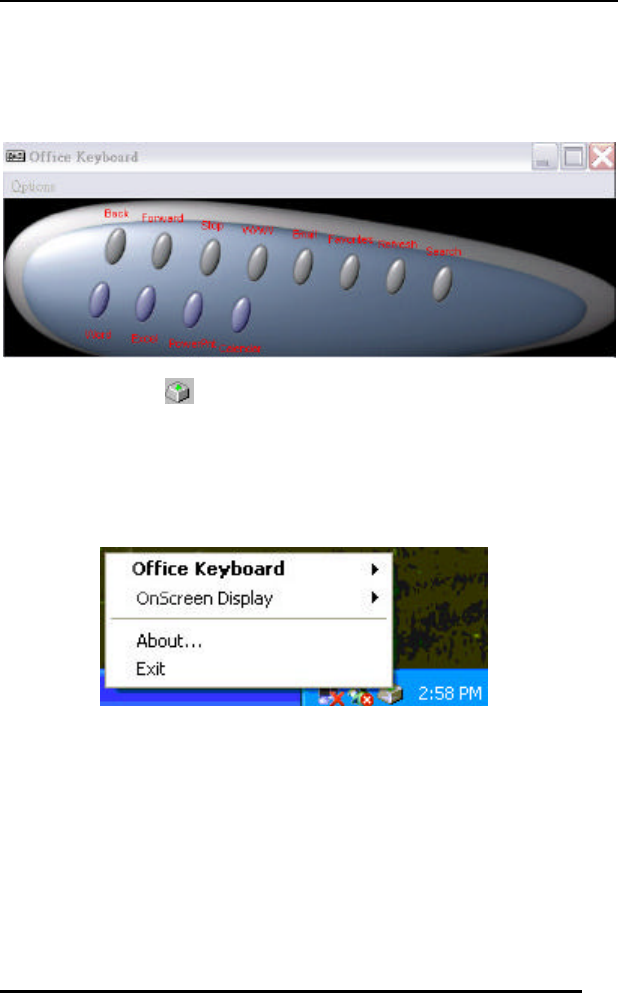
Wireless Office Keyboard And Mouse
16
Icon) to activate a menu with options to configure the OnScreen Display
and Office Keyboard Software.
OFFICE KEYBOARD BUTTONS
Left-click the icon on the taskbar of Windows to activate the Office
Keyboard Buttons. The 12 Office Keyboard buttons and an Exit button are
labeled according to their corresponding Icons. Left-click an OnScreen
button to define a key and then press the Hotkey on the keyboard to perform
the function that you defined.
WIRELESS OFFICE KEYBOARD
Ø Configure Buttons
When you activate the Wireless Office Keyboard and select the
Configure Buttons Item, you will see a 3D image on the screen. In
this mode, you can customize the functions of the Wireless Office
Keyboard. With your mouse, click one of the Hot Key Buttons and you
will see the default functions of that button. When the Wireless Office
Keyboard is in Button Configuration Mode, left-clicking one of the 3D

Wireless Office Keyboard And Mouse
17
Keyboard Image Keys that is user definable will bring up a dialog box
for customizing that button or key.
Ø Enable Taskbar Icon
Click this option to show or hide the Office Keyboard Icon on the
Taskbar. Clicking the 3D image option will also enable the Taskbar Icon.
Ø Close
Click this option to stop the Wireless Office Keyboard functions. All
hot key functions will be disabled and the Wireless Office Keyboard
icon will change color. When you left-click the Wireless Office
Keyboard icon again, the hot key functions will be enabled.
ONSCREEN DISPLAY
Ø Enable/Disable
This option toggles the OnScreen Display on and off.
Ø Select Color of Text
This option opens a dialog box that will help you select a color for the
OnScreen Display text.
Ø Select Font
This option invokes a dialog box for selecting the font for the OnScreen
Display. You may select any installed True-Type font for Windows® 98,
ME, 2000 and XP.
Ø Settings
This option allows you to select the size of the characters and icons used
in the OnScreen Display. You may also change the time-out value for the
display. This is the time that the display remains on the screen after a hot
button is pressed.

Wireless Office Keyboard And Mouse
18
ABOUT
Click this option to get information about the Office Keyboard software
version.
EXIT
Clicking the EXIT button will close Office Keyboard Software and
remove it from your computer’s memory. If you want to reload the Office
Keyboard Software, you must restart your system or click on the Start
Menu and select Programs to locate the Office Keyboard Icon and click it.
4. Patent List for Office Keyboard
Patent Name Country Patent Nor. Patent Owner
China 01219701.7
Pending ORtek
USA 09/838223
Pending ORtek
Germany 20106926.1 ORtek
Taiwan Pending ORtek
Office Clipboard
Block
Japan Pending ORtek
Germany 20113043.2
Pending ORtek
USA 09/917690
Pending ORtek
Japan Pending ORtek
China ZL01227259.0 ORtek
Office Purpose
Keyboard
Taiwan Pending ORtek
Other Patent Names are in the process of pending.
*All other brand or product names are trademarks or registered trademarks
of their respective owners.

Wireless Office Keyboard And Mouse
19
WIRELESS OPTICAL MOUSE:
1.INSTALLATION
l Package Contents: Batteries; Receiver; Software; mouse
l Install the batteries in the mouse.
l Turn off the computer. Connect the receiver to the desktop.
l Turn on your PC, and then install the software.
INSTALLATION FOR WINDOWS® 98/ME/2000/XP
• Before installing the Wireless Optical Mouse driver, check to see if
there are any other mouse drivers already installed on your system.
All other mouse drivers must be uninstalled BEFORE installing the
Wireless Optical Mouse drivers.
• Insert the Driver CD into your CD-ROM drive and the CD will
Auto Run. If it does not, please choose (Run) from the Start Menu.
The file name on the CD is ”AUTORUN”. The first screen is an
introduction. Read it before proceeding to the next step. The
software will automatically begin to install to your hard disk in a
sub-directory titled C:\PROGRAM FILES\Magic Function\.
After installation, you will be prompted to restart your computer in
order to enable the Wireless Optical Mouse software.
• Click (Finish) and restart your computer. The Wireless Optical
Mouse Icon will be activated automatically after Windows restarts.
NOTE: After installing the Wireless Optical Mouse drivers, you must
restart your computer, or the Wireless Optical Mouse software will not
be enabled.

Wireless Office Keyboard And Mouse
20
UN-INSTALLATION
To remove the Wireless Optical Mouse drivers from your system,
simply go to Starting à Program Files à Magic Function and choose
“Uninstall Magic Function program” application software.
2. WIRELESS OPTICAL MOUSE FUNCTIONS
AN OPTICAL MOUSE FUNCTION ICON WILL BE SHOWN IN S YSTEM
TRAY AFTER MAGIC FUNCTION HAS BEEN INSTALLED. APPEARS
"OPTICAL MOUSE" AS THE HINT WHEN MOUSE COMES OVER IT.
u A Pop-up Menu will appear with a mouse right-clicking of Optical
Mouse icon in system tray.
The Pop-up Menu contains:
Ø Option: To bring up the options dialog box for you to program
Mouse AP.
Ø Show/Hide Optical Mouse Icon: Show/Hide Optical Mouse Icon
and the default setting is "Show"
Ø Help : Launch Help file of Magic function.
Ø About: Information about the driver
Ø Exit : Exit “Magic function” program
u Magic Function Configuration:
Ø The Magic Function configuration tool will be located in the
"Mouse Properties" from the MS "Control Panel"
3. SETTING WIRELESS OPTICAL MOUSE AND PROGRAM
Setting Wireless Optical Mouse:
A. Make sure the receiver cable (purple) is plugged into the PS/2
keyboard port and the other cable (green) is plugged into the PS/2
mouse port.
B. Establish communication between the receiver and keyboard. The
bottom of the receiver has a channel switch. The bottom of the
keyboard also has a channel switch. When the receiver’s switch
setting on CH1, then the keyboard and mouse’s channel switch
should be setting on CH1. If the keyboard and mouse setting

Wireless Office Keyboard And Mouse
21
different channel with receiver, then they won’t work normally.
C. The bottom of the receiver and mouse both has an ID setting button.
Press the ID button on the receiver first; then the receiver’s LED
will glitter (about 0.5 second glitter one time). Then press the ID
button under the mouse. The receiver’s LED will stop glitter; it
means the mouse’s setting up is completed.
NOTE: When you replace the batteries, remember to reset
again!
D. This type of wireless keyboard and mouse can work in two radio
frequency channels. You may need to switch channel, for example,
if the signal from your mouse is conflicting with that from other
users close by. To change channel, please refer to Step B.
Setting Program:
This section describes how to use the Wireless Optical Mouse setting
program. Once the software installation for the Wireless Optical Mouse is
completed, the icon is shown on the Windows taskbar. Right click on
the (Optical Mouse Icon) to activate a menu with options to configure the
Magic Function Software.
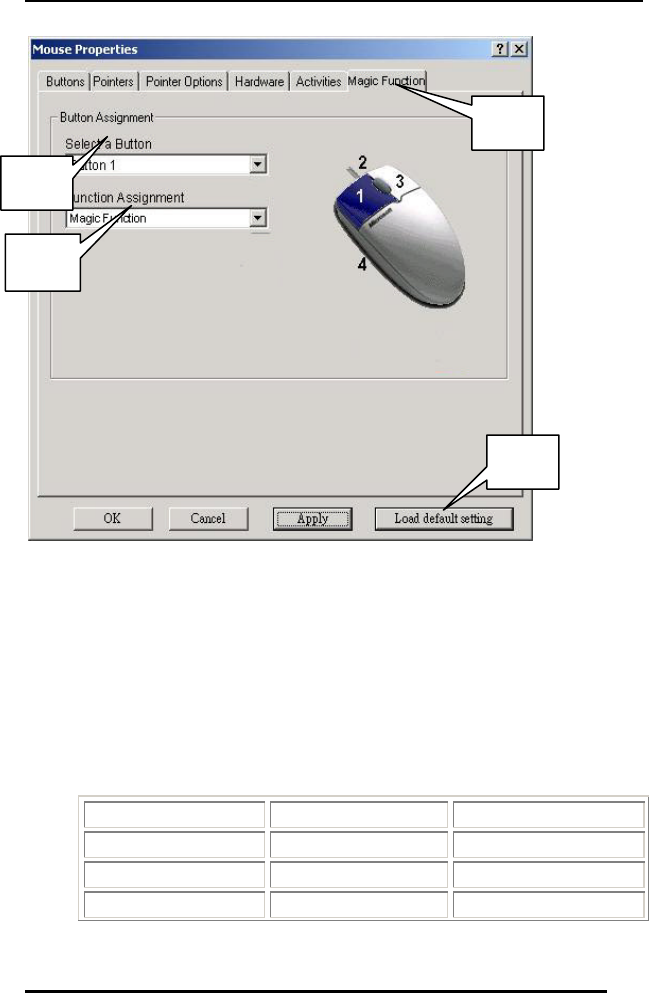
Wireless Office Keyboard And Mouse
22
5-1. Magic Function: Configuration tool provided for you to design
the mouse functions.
5-2. Mouse Buttons: There are 4 buttons of Magic function for
Wireless Optical Mouse. And you can select the functionality of
these buttons.
5-3. Function Assignment: There are totally 27 functionalities
listed as the following and you can select one of them easily in
this drop-pop menu.
1.Calculator 2.Copy 3.Copy/Paste
4.Control Panel 5.Cut 6.Display Property
7.Dos Shell 8.Eject 9.Email
10.Enter 11.File Explorer 12.F1-F12
5-2
5-3
5-4
5-1
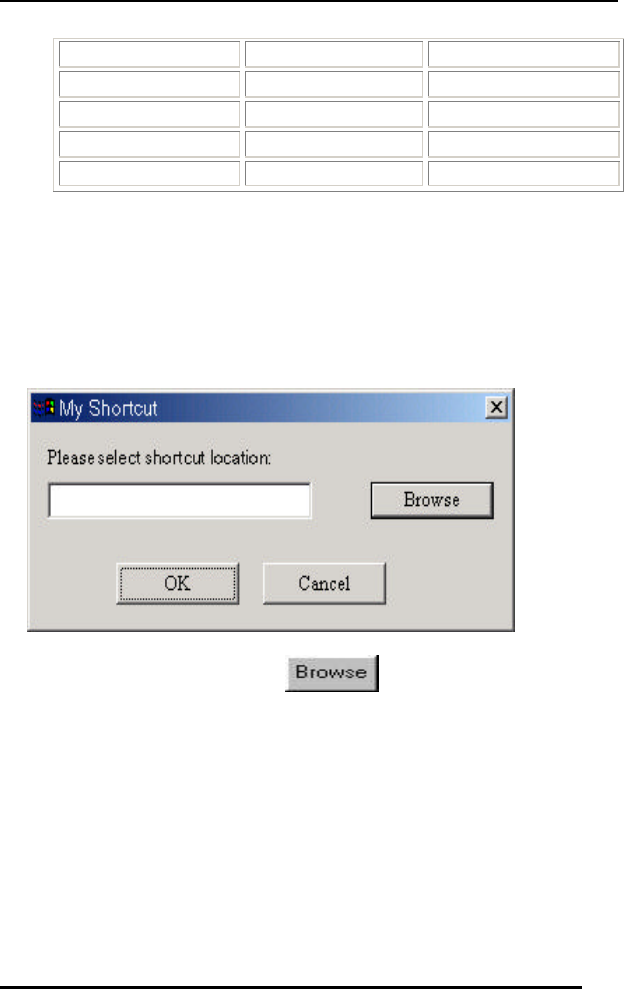
Wireless Office Keyboard And Mouse
23
13.Media Wheel 14.My Document 15. My Shortcut
16.Next Track 17.Paste 18.Play/Pause
19.Previous Track 20.Property 21.Screen Saver
22.Stop 23.Switch Window 24.System Property
25.Undo 26.Volu me Control 27.WWW
5-4. Load Default Setting: Easily for you to get the Default Setting
of Media Wheel
For My Shortcut functionality:
When you select this functionality, the dialog, as the following
will pop-up.
By clicking the browse button , end-user can select an
execution file to be launched by the assigned button.
After you assigned the shortcut, below dialog box will appear to
indicate you that Shortcut location you selected.
MAGIC FUNCTION
The below Interface will pup-up when you assign the button function
as "Magic Function".

Wireless Office Keyboard And Mouse
24
A-1 & A-3: Tack function. You can enable or disable it to make
Magic Function UI to appear on the screen or disappear
when mouse move away.
A-2: To close the Magic Function.
l The Media Wheel UI will come with function Hint in the central and
change the color when you move mouse over the UI.
l The 10 functions of Magic Function includes:
Ø 1-5 à 5-fix functions for Internet control functions, such as
Home, Stop, Refresh, Back and Forward.
Ø P1-P5 à 5 programmable functions for you to define easily.
And the default functionality of P1-P5 is as the following:
P1: Launch the application of E-mail
P2: Launch File Explorer
P3: Open Control panel
P4: Open My document
P5: Open the Help file of Optical Mouse
Right-click the button of UI to bring the Magic Function setting
dialog box.
TROUBLESHOOTING
If you have any problems using the Wireless Optical Mouse, please consult
the Troubleshooting Guide below to see if your problem is listed.
A
-
3
A-2
A-1

Wireless Office Keyboard And Mouse
25
Ø Wireless Product Does Not Work
• Make sure you have connected the receiver correctly (please refer
the setting up a wireless optical mouse). For optimal
performance, place the receiver at least 8 inches or 20
centimeters away from other electrical devices, such as the
computer, the computer monitor, or external storage drives.
• Make sure you have installed the batteries correctly. Check to
make sure the batteries you have installed are not dead. Try the
batteries in another device.
• If you are working on a metallic surface, try moving the receiver
closer to the mouse or standing the receiver on its side.
• Try unplugging then reconnecting the receiver cable to the
computer.
Ø Wireless Product Is Not Detected
• Make sure the receiver cable (purple ) is plugged into the PS/2
keyboard port and the other cable (green) is plugged into the PS/2
mouse port .Do not plug or unplug the receiver cable while the
computer is running.
• In Windows you may have other system devices that conflict with
the mouse, trackball, or keyboard. Check the IRQ/address settings
of these devices for conflicts, and change the settings as required.
Refer to your computer documentation to make these changes.
• Try unplugging then reconnecting the receiver cable to the
computer.
Ø Non-Wireless Pointing Device Is Not Detected
• Make sure the mouse cable is plugged into the right port - PS/2.
• In Windows you may have other system devices (e.g., a modem
card) that conflict with the mouse. Check the IRQ/address settings
of these devices for conflicts, and change the settings as required.
If the problem persists, please contact technical support.

Wireless Office Keyboard And Mouse
26
Ø Screen Cursor Does Not Move Properly
For wireless devices, try changing the position of the receiver. It is
possible that the receiver may be too far from the mouse. Or the
computer monitor (or a large metal object) may be interfering with the
receiver's radio reception. Also, the batteries may be low. Check the
batteries as described previously. You may also need to re-establish
the connection between the mouse and its receiver. To do this, first
press the Channel button on the receiver, and then press the Channel
button on the bottom of the mouse.
If you are using a mouse with optical technology and your tabletop
surface is red in color or is highly reflective like a mirror, your
tabletop surface may be interfering with the optical sensor of the
mouse. Try using a traditional mouse pad, or use the mouse on a
different tabletop surface.
Ø I cannot properly install other software applications.
If you want to install another software application but experience
problems, you may have to remove the Optical Mouse driver from
your system memory. Right-click on the (Optical Mouse icon) and
then chooses EXIT. Now install the desired software application. After
completion of the new application software installation, restart your
system, the Optical Mouse Icon will display in tray again.
Ø The Office Keyboard software is not working properly.
The Hot Key functions do not work after installing the Office Keyboard
Software. Please make sure you have no other drivers installed for
another brand of keyboard that uses Hot Key drivers. If so, you must
un-install the other driver and then reinstall the Office Keyboard
Software to fix the problem. (See next item)
Ø Add/Remove Office Keyboard Software and Re-Install
After you have installed the Office Keyboard software, the Office
Keyboard Icon will display on system tray. If you want to re -install the
software for any reason, you must delete the Office Keyboard software

Wireless Office Keyboard And Mouse
27
drivers from your system. Right-click the mouse button on the Office
Keyboard Icon and choose EXIT. Next, open the Control panel from
the Start menu and then select (Add/Remove) to delete the Office
Keyboard software. This will remove the drivers from your system.
Now you must restart your system and re-install the software drivers.
Note: You must use this procedure if you want to upgrade your Office
Keyboard functions or the software does not work properly.
Ø I cannot properly install other software applications.
If you want to install another software application but experience
problems, you may have to remove the Office Keyboard driver from
your system memory. Right-click on the (Office Keyboard icon) and
then chooses EXIT. Now install the desired software application. After
completion of the new application software installation, restart your
system, the Office Keyboard Icon will display in tray again.
Ø The Onscreen Display response is too slow.
If your CD-ROM drive response seem too slow, performance and
response can be improved by upgrading to at least a 4X CD-ROM
drive (or faster).
Ø Cannot use the Microsoft Windows default shortcut keys function.
The OFFICE KEYBOARD software driver will share some Windows
OS default short cut key function resources. Once the OFFICE
KEYBOARD drivers are installed, the following five (5) combination
keys cannot be used; you must choose another combination.
“CTRL+ALT+E”, “CTRL+ALT+P”, “CTRL+ALT+O”,
“CTRL+ALT+D”, “CTRL+ALT+C”.
**If you still cannot solve your problem, please contact with your
local dealer. **